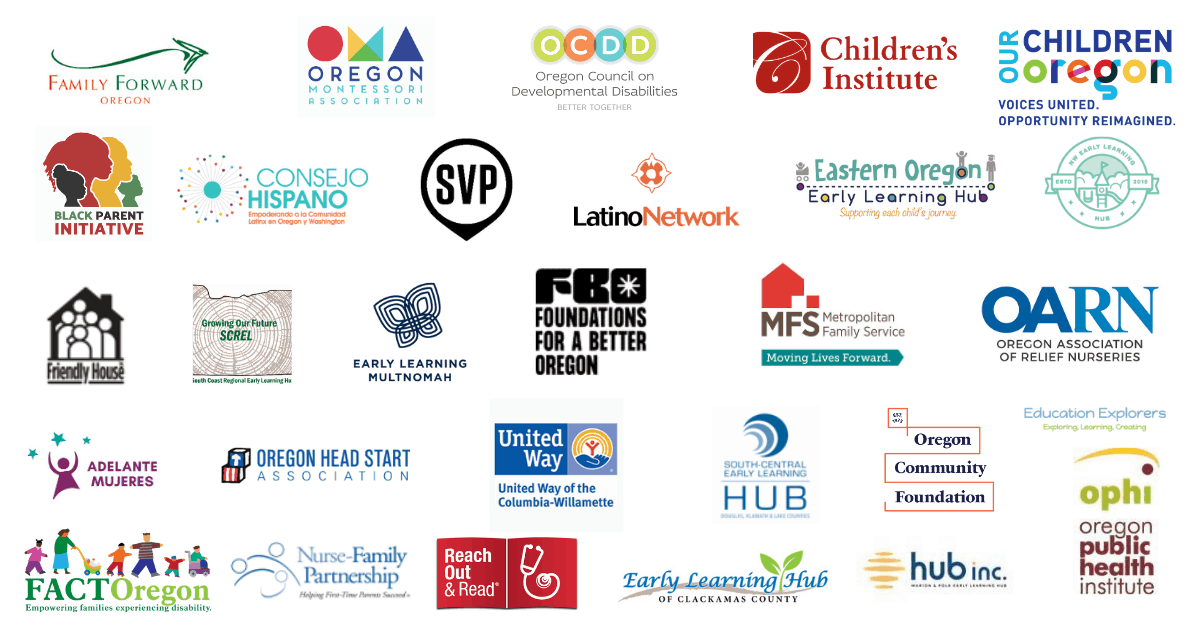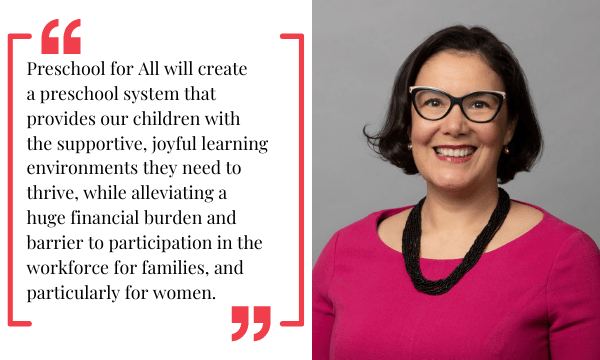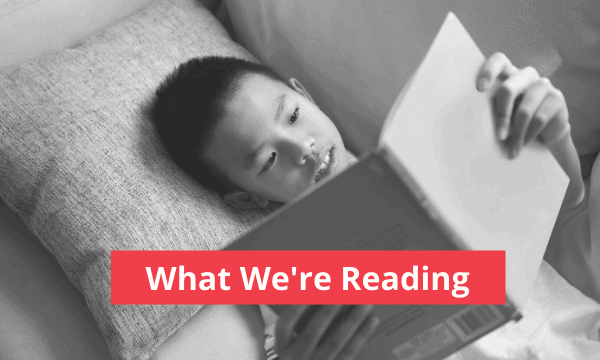ECC 2021 Legislative Agenda
All children are born full of potential, yet young children who experience barriers to opportunity due to racism, classism, and other forms of discriminatory policy and practice are often denied access to proven programs and services that strengthen early learning and healthy development. Before the age of 5, a child’s brain makes one million new neural connections every second, with early experiences shaping brain architecture. This stage of complex neural, social, and emotional development makes early childhood a critical window in which to eliminate disparities.
Children ages 0-5 are the most racially, ethnically, and linguistically diverse Oregonians, and they are the group of Oregonians most likely to live in poverty. Children born during the COVID-19 pandemic will be entering kindergarten just as we’re climbing out of a recession, and decisions made during this session will influence the trajectory of their lives and Oregon’s future.
Our 2021 agenda is guided by the experiences of Black, Indigenous, and families of color, and families and providers historically excluded from policy and budget decisions, and it is just the tip of the iceberg. These priorities, coupled with the historic passage of the Student Success Act, are the first steps toward implementing comprehensive change needed to build an early childhood system which addresses generations of exclusion and discrimination.

When racial equity is at the center of decision-making, early childhood programs and services can mitigate disparities by race/ethnicity, income, geography, disability, language, immigrant and refugee status, houselessness, and foster care. We ask legislators to commit to continued improvement in early care, education, and supports for all of Oregon’s young children and families and to center the voices of those most impacted by legislative actions in their decision-making processes. Solutions must be built with families, to work for them.
Have a question or need more information? Please email Malea Miller at malea@childinst.org.
2021 Legislative Priorities
Click on a section title to read more.
Advance Racial Equity with Community-Driven Solutions
Strategies for eliminating disparities work best when they are led by and designed for communities most impacted. These 2021 actions represent community-driven proposals to improve early childhood experiences for Black and Indigenous children and children of color.
Reduce/Eliminate Suspension and Expulsion in early care and education programs
Senate Bill 236/HB 2166, $5.8 million
Lead advocates: Black Child Development-PDX & Children’s Institute
National research concludes preschool has the highest suspension and expulsion rates of any age, and Black children are disproportionately impacted. Oregon can make progress on this issue by clearly defining suspension and expulsion; collecting data for accountability and improvement; supporting early childhood educators to build the skills that allow all children to thrive, such as anti-bias training and infant-toddler-early childhood mental health consultation; and ultimately preventing this practice altogether.
Create an Early Childhood Equity in Access Report
Senate Bill 237
Lead advocates: Children’s Institute & the Equity Collaborative
As we expand access to early childhood programs, we need to ensure these investments are reaching communities who have been historically excluded, with programs experienced by families as quality. A biennial report to the legislature will facilitate accountability around ensuring investments are reaching children and families regardless of race/ethnicity, disability, geography, and other factors.
Compel Congress to Keep Children and Families Safe from ICE in Early Childhood Settings
Senate Joint Memorial 1
Lead advocates: Latino Network & Children’s Institute
More than 70,000 Oregon children live with at least one undocumented family member, and their well-being is connected to Oregon’s future success. Passing a resolution to ask Congress to make ICE’s “sensitive locations” policy federal law is one step to ensuring early childhood settings are safe and nurturing places for children and families.
Create a Tribal Early Learning Hub
House Bill 2055, ELD POP 406, $900,000
Oregon Tribes requested a direct government-to-government relationship with the Early Learning Division. This proposal will establish a process to create a Tribal Early Learning Hub and Advisory Committee to serve Oregon’s nine federally recognized tribes.
Expand Early Childhood Investments
To increase equity and access in our early childhood system, Oregon must serve more children and families with programs that are more culturally relevant, inclusive, and developmentally appropriate. Oregon started to make progress with the Student Success Act, and more is needed to reach all children and families who are eligible.
Expand Access to Culturally Relevant, Inclusive, Developmentally Appropriate Preschool and Early Learning (Preschool Promise, OPK, and Equity Fund)
ELD POP 402, $35.8 m for OPK, $64.1 m for Preschool Promise, $3.4 m for Equity Fund
Lead Advocates: Oregon Head Start Association, Children’s Institute, and Latino Network
Recent investments in early learning have expanded preschool to reach more than 15,000 children, 1 out of 3 of the estimated 45,000 children who were eligible for publicly funded preschool before the pandemic. This investment will add over 6,000 preschool & Early Head Start slots, and increase grants to culturally specific organizations to serve 1,100 additional children without access to preschool to support kindergarten readiness.
Provide Wage Parity for Relief Nurseries
$4.8 million
Lead Advocate: Oregon Association of Relief Nurseries
Low wages in early childhood cause difficulty in recruiting, high turnover, and stress among early childhood providers. Recent progress on salaries in Head Start and Preschool Promise have been a step in the right direction, but haven’t been shared across the early childhood sector. This investment would allow Relief Nurseries to achieve wage parity with other early childhood programs and more effectively serve the 3500 children enrolled.
Expand Funding for Healthy Families Oregon Home Visiting
$10 million
Lead Advocate: Fight Crime: Invest in Kids & Ready Nation
In 2019, 600 families who were eligible for and requested services were not able to enroll in home visiting due to lack of funding. As Universally Offered Home Visits roll out, we anticipate as many as 12,000 new referrals to comprehensive, long-term home visiting. A $10 million investment could expand the number of families being served and prepare for future additional growth (securing a database, enhancing state agency staffing, and increasing home visitor salaries).
Expand Reach Out and Read to Underserved Families
Restore $75,000
Lead Advocate: Reach Out and Read Oregon
Early access to books and language are correlated with positive outcomes later in life. Reach Out and Read is poised to work with more medical clinics that serve majority BIPOC, low-income, and Medicaid families to get books and support for reading with children into communities.
Expand Access to Parenting Education
$2 million
Lead Advocate: Oregon Community Foundation
Evidence-based and culturally-specific parenting education programs have the potential to improve positive parenting strategies, help families manage parenting stress, reduce isolation, and increase connection with support critical for families to thrive.
Strengthen the Child Care System
Oregon’s child care system isn’t effectively meeting the needs of children, parents, providers, or Oregon’s economic recovery. Oregon must start now to build the system we need.
Reform Child Care Subsidy to Work for Children and Families
House Bill 2503/Senate Bill 239
Lead Advocate: Family Forward Oregon
To facilitate child development, strong families, and Oregon’s economic recovery, Oregon needs a functional child care system. Proposed legislation will create a stronger child care assistance program by making it more accessible to families, better for children, and more sustainable for providers.
Ensure Child Care Providers can Operate in Rentals
House Bill 2484
Lead Advocates: AFSCME & Children’s Institute
Home-based child care helps meet a critical child care need in Oregon. Yet, there are not currently protections for renters to operate child care businesses from their homes. This has a disproportionate impact on Black and Indigenous Oregonians and people of color, who are more likely to live in rental housing. Fair and reasonable protections are one piece of expanding child care access and opportunities for culturally specific child care settings.
Streamline Child Care Governance
Bring child care subsidy into a new state agency with other early care and education programs to elevate the importance of young children and their families, and allow for more seamless coordination and provision of services.
Invest in Families and Communities
Children develop in the context of their families and communities, and COVID-19 has increased disparities in health and economic outcomes for Oregon families. Children and families already facing financial and health-related stress due to systemic racism and poverty are disproportionately bearing the additional stressors of the pandemic. Supporting children means supporting their communities to thrive.
Protect and Grow Flexible Funding for Early Learning Hubs to Strengthen State-Community Connections, Regional Systems, and Parent Leadership
Restore $1.4 million
Lead Advocate: Early Learning Hub Leaders & Eames Consulting
Invest in strong Early Learning Hubs and parent councils to facilitate and empower local voices with resources for the work, vision, and solutions that align with the values specific for each culture. Invest in training, stipends, and staffing to recruit and retain families of color to participate in advisory boards. Protect local, flexible funding for Hubs, KPI, etc. to empower local parent councils and early care and education professionals to inform local and state policy and funding.
Increase Access to Nurse-Family Partnership Home Visiting by Using State Funds for Medicaid Match
Up to $5 million
Lead Advocate: Nurse-Family Partnership
Nurse-Family Partnership (NFP) is a long-term home visiting program proven to increase school readiness and prenatal health and decrease child maltreatment and mental health challenges. Nine Oregon counties offer NFP services with a combination of federal funds and county matching funds. With the state providing the match, families in additional counties could have the opportunity to access NFP services.
Invest in New, Affordable Housing for Families, Rural Communities, and Communities of Color
$250 million in Article XI-Q Bonds
Lead Advocate: Oregon Housing Alliance
One in three Oregon families struggle to afford safe and stable housing, and high housing costs make it hard to afford other basics such as healthy food and child care. Unstable or unaffordable housing undermines the physical and mental health of families and affects the likelihood that children will succeed in school. This investment would expand the LIFT program, which builds safe, stable, and affordable housing for people with low incomes in our community. LIFT prioritizes larger family-size units in new developments for families of color and families in rural communities.
Support College Students, Many of Whom are Parents, to Access Food and Basic Needs Assistance
$4 million
Lead Advocate: Hunger Free Oregon
Twenty percent of Oregon children experience food insecurity, meaning that their families lack consistent access to adequate nutrition to support an active, healthy life. Among Oregon’s college students, student parents face higher rates of food and basic needs insecurities than non-parent students. To ensure that all eligible students, a large percentage of whom are parents, are accessing benefits such as SNAP to feed themselves and their families, this bill would provide a benefits navigator on every public college and university campus in Oregon.
Strengthen Family Support and Create More Accessible Communities by Reinstating Funding for Family to Family Networks
Restore $1.3 million
Lead Advocate: Oregon Council on Developmental Disabilities
Families of children with disabilities have experienced exacerbated stress during the pandemic. Family to Family Networks provide support to 12,250 families experiencing disability and coordinate with 1800 partners to make Oregon more welcoming to all people. Restored funding will allow this important work to continue.
ECC 2021 Legislative Agenda
Agenda Legislativa ECC 2021

Latest on Policy from Children’s Institute
Oregon HB 3073 to Establish Early Learning Authority, Expand Child Care and Early Learning
Oregon House Bill 3073 (HB 3073) will streamline Oregon’s child care system by establishing a new state agency: the Early Learning Authority. The agency will be separate from the Oregon Department of Education. “A new department focused on early learning and care...
Multnomah County Commissioner Jessica Vega Pederson Honored with Alexander Award
Children's Institute is pleased to honor Multnomah County Commissioner Jessica Vega Pederson with the Alexander Award for her efforts to implement a universal preschool program in Multnomah County. The Preschool for All ballot measure, which passed in November,...
RAPID-EC Survey Highlights Challenges for Families During COVID-19
New data from the RAPID-EC Project (Rapid Assessment of Pandemic Impact on Development-Early Childhood) highlights the challenges families with young children face during the COVID-19 pandemic. “How Are Our Children? Updates and Policy Implications from the...



